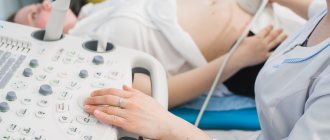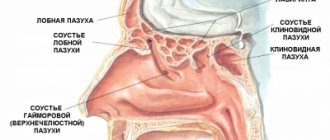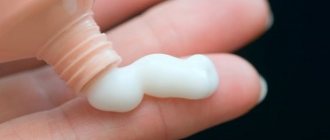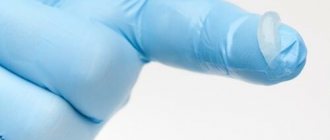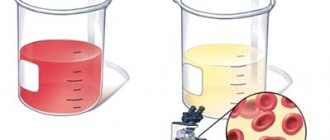February 28, 2020
According to the World Health Organization, hemorrhoids in various forms occur in almost 70% of the world's population
According to the World Health Organization, hemorrhoids in various forms occur in almost 70% of the world's population. This includes anyone who has ever experienced symptoms of this disease. Unfortunately, many people are embarrassed to see a doctor and self-medicate, because they believe that it is not customary to talk about such problems.
What are hemorrhoids?
The rectum is the final point of the human digestive system, and therefore plays a very important role. It is surrounded by a double - external and internal, hemorrhoidal plexus of veins, which ensures a hermetic closure of the anus.
If the blood flows in too much or flows out too slowly, blood stagnation forms in the veins. As a result, the vessels swell, forming hemorrhoids (they are also often called lumps). This causes pain, a sensation of a foreign object in the anus.
Under the influence of constant pressure from large accumulations of blood, the walls of the veins become thinner and collapse. Bleeding occurs, particles of feces and other contaminants get inside the vessels, which leads to the formation of a focus of inflammation. As a result, the pain becomes simply unbearable, the person can neither sit nor lie down, and is afraid to go to the toilet.
Common Misconception
When the first symptoms of hemorrhoids appear, you should consult a specialist.
Many people do not consider it necessary to take countermeasures when the first symptoms of the disease appear. People try not to think about the problem and reassure themselves that it will go away on its own.
People usually begin to seek the help of specialists after unbearable sensations appear. However, if you already feel difficulty during bowel movements, it means that the situation is not simple, and it will take a lot of time to normalize it.
Symptoms of hemorrhoids
The disease progresses gradually over several years. The key to successful treatment is contacting a proctologist as soon as you notice the first symptoms of hemorrhoids.
All stages of the disease are characterized by the following symptoms:
- discomfort in the anus;
- pain during bowel movements;
- anal bleeding;
- traces of bright scarlet blood on linen, toilet paper, toilet;
- mucous or watery discharge;
- the formation of hemorrhoidal cones, their gradual increase in size.
In the initial form of the disease, there is a slight enlargement of the veins, but the person usually does not notice it. The only thing that indicates hemorrhoids is traces of bright scarlet blood on toilet paper after visiting the toilet. This is already a serious reason to consult a doctor, since bleeding may be a sign of a malignant tumor in the intestines.
When hemorrhoids enter the second stage, a person from time to time feels pain during bowel movements, itching, burning in the anus, and it seems to him that there is a foreign object inside. Hemorrhoidal cones sometimes fall out, but are easily adjusted by the patient on their own.
In the third stage, the symptoms described above intensify. Venous lumps increase significantly, narrowing the lumen of the anus and making defecation difficult. When visiting the toilet, a person experiences severe pain and bleeding often begins.
As the disease progresses to the fourth stage, the hemorrhoids enlarge so much that they cannot be moved inward by hand. The pain is very severe, each bowel movement is accompanied by bleeding. Blood clots – thrombi – form in the veins.
Hemorrhoids develop in two forms - external and internal. In the first case, the lumps are located close to the anus, so they often rupture and bleed during bowel movements. The pain is sharp and severe. In the second case, hemorrhoids can occur without pronounced symptoms, since the venous nodes are located inside the rectum, the mucous membrane of which is insensitive.
Features of the use of different forms
Depending on the type of medicine, its main characteristics and methods of administration into the body change. Proctologists prefer to use different forms of medication to achieve optimal results in the fight against hemorrhoids.
Pills
Most tablets have a natural component composition, which reduces the likelihood of allergic reactions. They are approved for use by pregnant and lactating women. The advantages of tablets include the method of their use - oral.
Some patients have a negative attitude towards suppositories due to their own prejudices or reluctance to perform procedures that are unpleasant for them. A regular tablet can be taken anywhere, if the occasion is appropriate; when taking it, it is enough to wash it down with water.
In addition to special drugs against hemorrhoidal disease, the treatment regimen may include drugs to stabilize the functioning of the gastrointestinal tract. They are prescribed when clinical signs of chronic diarrhea or constipation are detected in a patient.
To suppress the symptoms of external hemorrhoids, treatment is carried out using:
- Venorutona;
- Ginkor Fort;
- Glivenol;
- Detralexa;
- Pylexa;
- Phlebodia 600;
- Chemoroidin;
- Cyclo 3 forts.
Proctologists advise not to indulge in self-medication. The selection of the optimal remedy should be carried out by a doctor, based on the results of a laboratory diagnostic study. Incorrect selection of the drug can affect the general condition, complicate the course of the disease, and lead to complications.
Candles
Suppositories have a pronounced anti-inflammatory, venotonic and analgesic spectrum of action. Suppositories are among the best dosage forms for the treatment of hemorrhoids due to their direct effect on the affected area. Most medications have a mild effect and do not cause discomfort.
The disadvantages of the drugs are the complexity of use, the impossibility of administration in cases of severe pain and severe bleeding. The use of suppositories follows the standard scheme:
- The appointment is scheduled for the evening, before bedtime;
- Before the procedure, the intestines must be cleaned of feces;
- application takes place after the act of defecation - independent or provoked by a cleansing enema.
To prevent pathogenic microflora from penetrating damaged tissues, the patient must comply with all hygiene requirements. The suppository is installed in a vertical or horizontal position (on its side). After inserting the suppository, you cannot change your position for half an hour, otherwise the dissolved drug will leave the rectum and will not have the expected effect.
To combat thrombosis of hemorrhoids, therapy requires the use of:
- Anuzola;
- Diclofenac;
- Ibuprofen;
- Indomethacin;
- Methyluracil;
- Relief.
Suppositories have a number of advantages over tablets: they do not cause adverse reactions on the mucous membranes of the gastrointestinal tract, and are safer. Violation of the rules of use will negatively affect the results of therapy - the patient must follow the entire step-by-step treatment algorithm.
Etiology of hemorrhoids
Varicose hemorrhoidal plexus occurs in men and women at any age. The causes of hemorrhoids are varied.
- Hereditary weakness of the walls of blood vessels, disruption of intestinal innervation.
- Lifting weights, excessive physical activity, as a result of which blood flows intensely to the rectal area.
- Prolonged standing or sedentary work, sedentary lifestyle
- lead to a slowdown in blood flow.
- Chronic constipation and diarrhea - feces irritate the mucous membrane and put too much pressure on the blood vessels.
- The habit of pushing hard during bowel movements leads to increased blood pressure on the walls of the veins.
- Poor nutrition, abuse of fatty spicy foods, alcoholic beverages, stress - negatively affect the regularity of bowel movements.
- Inflammatory and tumor processes in the liver and intestines.
- Smoking - under the influence of nicotine, the lumen of blood vessels narrows, and their walls become thin and fragile.
- Passion for anal sex and anal sex toys.
Hemorrhoids in women often occur after pregnancy (especially if it was multiple) or long, difficult labor, since pushing and the fetus create strong pressure on the blood vessels.
Desarterization
Termination of access of arterial blood supply to the hemorrhoidal node is the main goal of disarterization. Treatment of hemorrhoids is carried out by “flashing” the arteries that supply the node.
From two to six arteries are sutured by a proctologist using special, state-of-the-art equipment. The coloproctologist learns about the detection of a hemorrhoidal node by the signal that comes from the Doppler, a special sensor placed in the anal canal.
The doctor does the firmware through the anoscope, or more precisely, through its side window. The manipulation lasts up to half an hour, and the patient then needs up to two hours to recover. The procedure is done without general anesthesia.
In the day hospital, the patient is observed for one to two hours after treatment. One procedure is enough to obtain effective treatment for hemorrhoids using the disarterization method.
Prevention
The best measures to prevent the development and exacerbation of hemorrhoids, according to proctologists, are proper nutrition, improving bowel function, physical therapy, and careful hygiene.
In order for stool to be regular and have optimal consistency, it is necessary to monitor your diet.
- Consume fermented milk products.
- Eat raw vegetables and fruits rich in fiber.
- Eat small meals 5-6 times a day.
- Don't neglect oatmeal and bran bread.
- Take vitamins A, B, C, E, calcium, magnesium.
- Drink enough water, observing the daily norm of 1.5-2 liters.
- Avoid spicy, fried, fatty, smoked, alcohol.
Take laxatives only when absolutely necessary. Use teas and drinks with a laxative effect with caution, otherwise the intestines will literally “forget how” to work.
To strengthen the walls of blood vessels, take a course of phlebotonic drugs twice a year.
Therapeutic exercise and massage are also very useful because they help improve blood circulation and prevent congestion. If you find yourself in the same position for long periods of time, take regular small breaks to walk around or do at least a few squats. There are also special exercises for the anal sphincter and improving bowel function, but during an exacerbation they should not be done.
It is extremely important to carefully observe hygiene: wash your face every day, change your underwear, clean the anus with a damp cloth (without alcohol or fragrances) after each bowel movement.
Laxatives
If symptoms of hemorrhoids appear, you should consult a specialist.
Since hemorrhoids develop with constipation, it is necessary to monitor normal bowel movements. Timely intake of laxatives, for example Mil-para, will help normalize stools and make the consistency more flexible. This will promote the healing of cracks and wounds.
If symptoms appear, consult a doctor only. Self-medication for hemorrhoids is unacceptable. Only treatment prescribed after a comprehensive examination will help cope with the problem. The best option is a combination of different means that are selected individually.
Drug and minimally invasive treatment
Treatment of hemorrhoids at the initial stage can be carried out at home, since no special measures are required yet. The doctor usually prescribes the following:
- a course of vascular-strengthening drugs;
- suppositories for hemorrhoids to relieve pain, itching and other unpleasant sensations, as well as to fight inflammation and reduce lumps, heal, stop bleeding;
- therapeutic diet and special physical training after the exacerbation is relieved;
- To relieve pain and itching, it is recommended to use cold compresses, ice packs, warm chamomile baths,
During the second and third stages, when conservative methods are ineffective, minimally invasive procedures are prescribed such as:
- Sclerotherapy - substances are injected into the node that seem to glue its walls together. As a result, the tissues stop receiving nutrition and die.
- Infrared photocoagulation, electrocoagulation - the essence of the method is that the leg of the node is cauterized, and its tissues are deprived of nutrition, stick together and die.
- Ligation with latex rings is used for internal hemorrhoids of stages 1-3. Using an anoscope, a ring is placed on the leg of the node, which compresses the small vessels feeding the node. After about two weeks, the dead node is brought out along with the ligature.
- Cryotherapy is a short-term exposure of the node to liquid nitrogen. The goal is the same - to stop the blood supply to the tissues of the node. After that it disappears on its own.
The listed remedies for hemorrhoids are effective for small bumps, but they cannot be used for thrombosis, anal fissures, acute inflammation, and injuries.
How does the disease develop?
If the first complications make themselves felt in the form of bloody discharge, then later patients are faced with prolapsed hemorrhoids. In the absence of timely assistance, the process becomes irreversible: the nodes simply cannot be set back.
The surgical method is the last option to correct the difficult situation with hemorrhoids. But if you consult a doctor immediately after the first symptoms appear, then it will not come to surgery; everything will be corrected using a conservative method.
The best veinotonics for hemorrhoids
Les Laboratoires Servier "Detralex" - a multifunctional venotonic for acute and chronic hemorrhoids
5.0
★★★★★
editorial assessment
100%
buyers recommend this product
Tablets with a venotonic effect are intended for the treatment of varicose veins and hemorrhoids. The product contains flavonoids, hesperidin and diosmin. The product strengthens the walls of blood vessels, increases the elasticity of veins and prevents blood stagnation.
For acute hemorrhoids, the drug is taken 6 tablets per day for 4 days, then the dosage is reduced to 4 tablets. In the chronic form of the disease, the dosage of Detralex is 2 tablets per day for up to several months.
The product is contraindicated in case of lactation and individual intolerance to the components of the formula, and its long-term use can cause general weakness, nausea, diarrhea and skin rashes. Detralex does not have a teratogenic effect, therefore it is recommended for hemorrhoids and pregnant women.
Advantages:
- Versatility;
- Effective for acute and chronic hemorrhoids;
- Can be taken by pregnant women;
- Long-term use is possible;
- General positive effect on blood vessels and veins;
- Available in various dosages (500 and 1000 mg).
Flaws:
- Contraindicated during lactation;
- High cost - about 2500 rubles for 60 tablets.
Detralex is prescribed for the treatment of hemorrhoids caused by disorders of the venous and vascular systems.
Laboratories Innothera "Phlebodia" - treatment of varicose veins of the rectum
5.0
★★★★★
editorial assessment
100%
buyers recommend this product
The drug contains 600 mg of diosmin, due to which it has an intense venotonic, anti-inflammatory and lymphatic drainage effect.
The drug in tablet form is prescribed to adults for the treatment of varicose veins and hemorrhoids, 1-3 tablets per day. The duration of therapy is individual.
Long-term and excessive use of capsules provokes diarrhea, heartburn, constipation, headaches and hives.
Phlebodia is contraindicated for persons under 18 years of age, in the first trimester of pregnancy and during breastfeeding. For the treatment of acute hemorrhoids, Phlebodia is used in combination with hemostatic agents, anticoagulants and astringents.
Advantages:
- Pronounced venotonic effect;
- Strengthens the walls of veins and blood vessels;
- Can be used in the II and III trimesters of pregnancy;
- Minimum contraindications;
- Suitable for long-term use.
Flaws:
- Contraindicated for minors;
- High price - 1800 rubles for 60 tablets.
Phlebodia is an effective venotonic agent, especially recommended in the treatment of thrombosis of hemorrhoids.
READ ALSO
12 Best Nootropics

